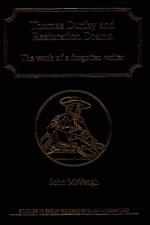|
This section contains 8,262 words (approx. 28 pages at 300 words per page) |

|
SOURCE: Wheatley, Christopher. “‘But speak every thing in its Nature’: Influence and Ethics in Durfey's Adaptations of Fletcher.” Journal of English and Germanic Philology 95, no. 4 (October 1996): 515-33.
In the following essay, Wheatley discusses three plays Durfey adapted from dramas by John Fletcher, arguing that the adaptations show an interest in ethical problems seldom attributed to Durfey in particular or to Restoration comedy in general.
Thomas Durfey, the most prolific playwright of the Restoration, adapted three plays by John Fletcher: Trick for Trick (1678) from Monsieur Thomas (1615), A Commonwealth of Women (1685) from The Sea Voyage (1622), and A Fool's Preferment (1688) from The Noble Gentleman (1626). Durfey's adaptations are interesting because they force qualification of critics' assumption of widespread “influence” of Fletcher's plays in the Restoration, at least in the sense of deference to or imitation of Fletcher's dramatic practice. But the plays are also important because they show a more consistent interest...
|
This section contains 8,262 words (approx. 28 pages at 300 words per page) |

|


